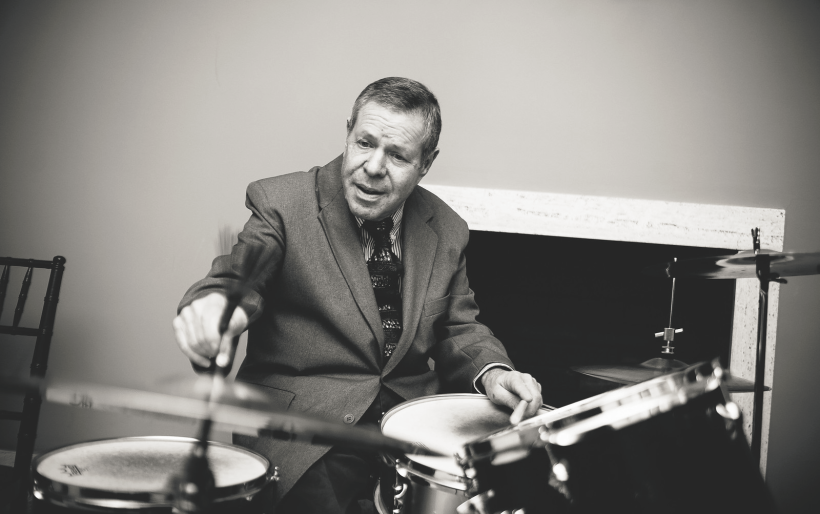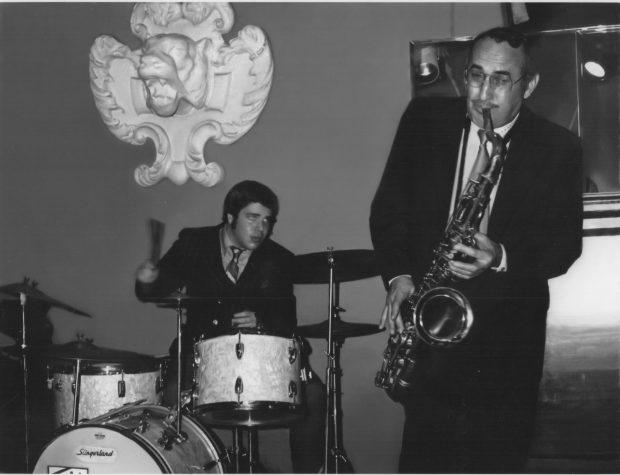Bruce Klauber on life, love, Frank, Buddy, Gene and the swing of big band jazz

Bruce Klauber | photo by Jim Dofton | courtesy of the artist
Along with being the principle literary and video biographer of big band rhythmatists Gene Krupa and Buddy Rich, Philadelphia’s Bruce Klauber holds his own legend – local and beyond – as a jazz drummer and vocalist.
As a young man, Klauber played with top-tier instrumentalists such as Al Grey, Charlie Ventura and Milt Buckner. For the better part of this decade, he’s been the drumming part of the All-Star Jazz Trio, an inventive outfit whose weekly gigs as a threesome are often highlighted by dynamic local vocalist, Peggy King.
After having recently acted as a technical advisor on the Academy Award-winning film Whiplash, Klauber just released his new book, Reminiscing in Tempo: Farewells and Recollections of Showbiz, Jazz and Drums and, on October 15 at 3 p.m., leads the All Star Trio, the 15-piece Monday Blues/Jazz Orchestra, and vocalist extraordinaire Mary Ellen Desmond through an afternoon of swing at World Cafe Live Upstairs and “A Big Band Salute to The Legends of Jazz Drumming.”
The Key: What was your personal relationship with Krupa and Rich like?
Bruce Klauber: I knew Krupa and spent some time with him during my young days when I worked with his long-time saxophonist Charlie Ventura. What an angel he was. Krupa was my first drumming inspiration. My closer association was with Buddy Rich. I knew him, interviewed him several times, hung out with him, went to hear his band from 1966 to 1987 whenever he was appearing within 100 miles of where I lived, and in 2002, I wrote and co-produced the only officially sanctioned video on Buddy Rich’s life and music–produced in conjunction with Buddy’s widow and daughter–Buddy Rich: Jazz Legend, a Warner Bros. release. I’ll make no bones about it. For years, Buddy Rich was my idol. And the idol of many. Indeed, part of our performance is a celebration of what would have been Buddy’s 100th birthday.
TK: When and where did you meet your idols?
BK: I first met Krupa around 1966 when he was playing the famous Metropole Cafe’ in New York City. A year later, I met him at Steel Pier in Atlantic City. I was like 14 or 15 years old, playing in a rock band called, sad to say, “The Facts of Life. “ We had a single, “I’ve Seen Darker Nights,” which was recorded when I was 14 and some clown posted it on YouTube. It sounded lousy than, and it still sounds lousy now.
TK: You knew him. We have also heard that Rich’s temperament was ‘mercurial’ at best. What say you?
BK: Buddy’s temper was no secret. The infamous “bus tapes” have become the stuff of legend. But there are a couple of things to take into account about this man. He was performing on the vaudeville stage from the age of 18 months old and came up in an era where you scratched and clawed your way to the top. And this was also a man who played with every giant of jazz in the universe; giants who personified perfection and professionalism and never gave less than 110 percent of themselves. So what does a guy like Buddy Rich do when he found himself surrounded by a bunch of kids in the band who, from time to time, showed themselves to be a bunch of self-indulgent, amateur slackers who he knew were capable of giving and being much, much more? The Buddy Rich I knew and loved was a man who cared deeply about jazz and those who played it, about respect, about professionalism, and about never asking that anyone give any more than he did: 110 percent perfection.

Bruce Klauber at 16, drumming for saxophonist Charlie Ventura | photo by David Myers | courtesy of the artist
TK: And what about jazz at that point in your youth? When and why did that become part of your musical diet?
BK: The only jazz I was playing then was with Andy Kahn, who I met when I was 10. (Kahn is the pianist in the All Star Jazz Trio). At that point, my meeting with Krupa came about because I was hanging around backstage, hoping to meet him. I was with Charlie Ventura here in Philadelphia from around 1970-1972. We were playing a joint called The Saxony East on Walnut Street, now CIBO. Gene came into this joint called Brandi’s Wharf several times around 1971, and Ventura was with him. That’s where I got to know Gene and spent some time with him. As for Buddy, I first saw him in 1960 when he was with Harry James, playing at the St. Joseph’s Field House on 54th and City Line. I didn’t meet him until around 1978, when I first interviewed him. I was scared to death. Turned out he had checked me out, as he had with a lot of young drummers. First time I hung with him was on the bus, parked behind where the band was appearing at the late and lamented Temple University Music Festival.
TK: You’re talking big band music here. What sort of big band scene did Philly maintain when you started playing? And how has that morphed through the decades until now?
BK: When I was coming up, beginning in 1960, believe it or not, there were still a lot of name bands on the road and many of them visited this area frequently. Buddy Rich was a regular at a fondly-remembered place called Brandi’s Wharf, close to where the SugarHouse Casino is now. So was Maynard Ferguson and Stan Kenton. Buddy and a couple of other big bands also appeared at a place called Just Jazz, 2119 Arch Street. Ellington, Basie, Harry James, Woody Herman, and Stan Kenton sometimes came to a big restaurant/hall in Wayne, PA called The Conestoga Inn. And up until about 1969, there was a different big band at Atlantic City’s Steel Pier each and every week. In terms of local groups, there was plenty of activity as well, as each nightclub –The Latin Casino, Palumbo’s, Schiolla’s — all had world class house bands. While there are barely any road bands existing any longer, look at what we have locally: Bands led by Phil Giordano, Brian Pastor, the Clef Club big band, South Philly Big Band, the incredible, student-populated Philadelphia Jazz Orchestra; The Jazz Orchestra of Philadelphia; the fabulous big bands coming out of the University of the Arts, and all the other jazz schools; and, of course, the swinging band I’m working with on this show, the Monday Blues/Jazz Orchestra.
TK: Let’s talk about this new book Reminiscing in Tempo: Farewells and Recollections of Showbiz, Jazz and Drums. Have you said or written anything salacious now that many of its subjects are gone? I know you had the pleasure of knowing Sinatra who – and this is high praise – said of you, “It is quite obvious you are an educated student of American popular music, and your knowledge of some marvelous and memorable years in America’s musical history is truly impressive. Your warm words supporting my music and my efforts as a musician honor me and touched me deeply.”
BK: I wouldn’t really use the word “salacious,” as I’m not really built that way. There are, however, several stories that may show some different sides of some showbiz folk we’ve known and loved. Frank Sinatra and Jerry Lewis, for example, were simply beyond beautiful to me, in generous ways that I’ll never forget. Mel Torme’, one of the few certifiable geniuses produced by show business was incredibly helpful to my career, but working with him –he wrote the forward to one of my books and narrated one of my videos — could drive you up a wall. Comic Pat Cooper, still with us but long off the scene, was an absolute nut who went crazy when he ran into a comic who he felt couldn’t ad lib. Then there are the stories about hanging out with Norman Mailer, eating apple pie in the kitchen of the Four Seasons Hotel with Charles Mingus and Andy Kahn, spending the day with Mr. and Mrs. Moe Howard, crying on the shoulder of Lou Rawls, and in the “what I did for love” segment, a chapter on singer and hit-maker Joanie Sommers. When is the last time you heard all those names in one sentence?
TK: So what music are you making with the big band, Mary Ellen Desmond and the trio at WCL this week?
BK: The big band show has several parts. In addition to playing some fabulous Buddy RIch charts, we will be paying tribute to the music of Gene Krupa, as well as bandleaders Benny Goodman, Artie Shaw, Tommy Dorsey and the vastly influential but almost-forgotten Chick Webb. Mary Ellen Desmond will be paying vocal tribute to Ella Fitzgerald and Anita O’Day, and The All-Star Jazz Trio–Kahn, Bruce Kaminsky and myself–will be anchoring, driving and swinging the big band. And yes, if the mood strikes and you never know when the mood will strike, I may sing a song. Hey. It’s my gig, so I can do anything I want.
Bruce Klauber leads A Big Band Salute to the Legends of Jazz Drumming on Sunday, October 15th at World Cafe Live. More information on the show can be found here.